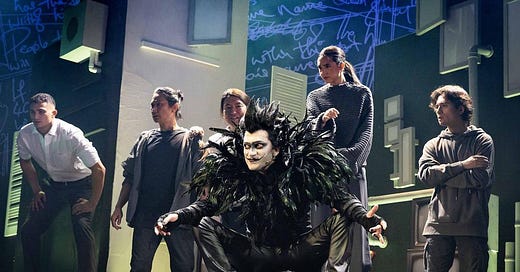THIS MANGA IS A FRANK WILDHORN MUSICAL
While he was away from Broadway, this American composer became one of the most popular theater creatives in the world. Now he's readying his return to New York and London.
Welcome back to your maybe-weekly guide to the international theater industry, Jaques, where it’s Week 2 of the Great Schedule Experiment of 2024. You can read more about it in last week’s post, but the short version is this: Rather than the biweekly schedule of the last couple months, we’re trying out weekly emails in an effort to break up these long posts and make them a little more reader-friendly.
The proposed plan is to divide the biweekly email into its two main components and alternate weeks between the news aggregate ABROAD/WAY BULLETPOINTS (see: last week) and the deep-dive SPOTLIGHT STORY (e.g. this week’s edition). Free readers will receive the complete BULLETPOINTS and a preview of each SPOTLIGHT; paid readers get the full Jaques.
Here’s an easy way to tell me what you think:
The poll will be open for a week. Have at it! And if you have more to add, you can always drop me a line.
SPOTLIGHT: WILDHORN, INC.
Back in October I spent a rainy Saturday morning at New York Comic Con getting to know Death Note: The Musical. It was the first I’d heard of the show, a seemingly unlikely stage adaptation of a hugely popular manga about a homicidal high school student with a stringent moral code, the death spirit who enables his supernatural killing spree, and the enigmatic detective on his trail. Among the performers at the Comic Con showcase was Adam Pascal, the Broadway fan-favorite who was in the original cast of Rent. He sang a few songs as a death angel named Ryuk.
This startling cultural collision was new to me, but Death Note isn’t a new musical. It’s been around since 2015, when it premiered in Tokyo in a Japanese-language production. It’s since played two more runs in the city, one in 2017 and one in early 2020, and has also played Moscow and Rio. A 2022 staging in Seoul won the Korean equivalent of the Tony Award for best musical. Last year, a West End concert version, initially planned for two nights at the London Palladium, sold out so quickly that they added one more performance there and then ran another eight shows at the Lyric Theatre.
And it turns out this manga-to-musical adaptation isn’t just a one-off. I discovered to my surprise that Death Note is one of three manga-based titles on the resume of Frank Wildhorn, the American composer (Jekyll & Hyde, The Scarlet Pimpernel, Bonnie and Clyde) who was omnipresent on Broadway in the late ’90s but hasn’t had a show play there in more than a decade.
Those three manga shows are just the tip of the iceberg. Over the last 20 years, the prolific Wildhorn has written a whole raft of musicals (find the full list at FrankWildhorn.com) that have made him one of the most popular theater composers in the world—even if most Americans don’t know these shows even exist.
It’s no secret that sometimes there’s a whiff of Broadway snobbery in American attitudes toward Wildhorn’s work. (See, for example, the 2000 profile in the Washington Post winkingly headlined “The Scourge of Broadway.”) But with a big, varied catalog of musicals regularly produced all over the world, and commissions from producing organizations in Switzerland, Korea, Japan and China, it’s clear that Wildhorn writes work that connects—and that the pace and breadth of his career has given him a unique perspective on the international theater industry.
So I gave Wildhorn a call to hear him tell it in his own words. In this SPOTLIGHT STORY, I’ll highlight:
the factors that played a role in the global growth of his career, and the insights he’s gleaned along the way
the differences he sees in local markets and audience appetites
his take on the state of the international industry and his advice for young artists and producers
the two shows he calls the “one-two punch” of his imminent return to New York and London
I reached Wildhorn at his home in Hawaii, a location he likes because it makes his frequent travels to Asia a little easier, and because the time zone agrees with his writing schedule. (Plus, you can’t beat the weather.) Here’s our conversation, presented as a Q&A and edited for length and clarity.
THE PUSH OUT THE DOOR
Frank, when and how did it become clear to you that international was going to become a major part of your career?
I have to give all the credit to Freddie Gershon1, who is my Yoda and the smartest man in show business. It was in the early 2000s, coming off of having three shows on Broadway at the same time.2 Freddie’s company MTI was starting to license my shows around the world and he said to me, “Frank, you’re a pop guy, so you know how much a percentage of your income, and the income of your family and your children, comes from international royalties. Every time we license one of your shows around the world, you get two first class tickets to see those productions and make those relationships. You need to take advantage of that.” It was Freddie who pushed me out the door.
Pretty soon after that your international work really picked up momentum. How’d that come about?
Keep reading with a 7-day free trial
Subscribe to Jaques to keep reading this post and get 7 days of free access to the full post archives.




